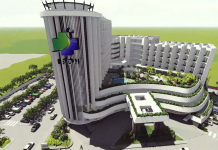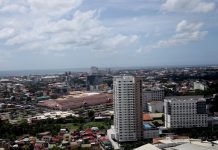What initially shaped up as the ‘odd man out’ in architect Felino “Jun” Palafox’s master plan is not unintended: a 3-hectare extension campus of the University of the Philippines inside the 88-hectare Agriya in Panabo City.
In fact, it was part of the plan all along, setting the Agriya truly apart from any flagship project this side of archipelago.
“It’s being true to our roots,” beams Ricardo “Carry” Lagdameo, the vice-president of Damosa Land with pride, and who represents the third generation of a family that pioneered–alongside with the Floirendos—the banana plantation industry in the Davao region.
The emerging UPLB campus in Agriya serves to further cement this legacy and more. In a short while, students interested in taking up agricultural courses need no longer go to Los Banos.
It is now located in the neighborhood so to speak, alongside other development features that will include a convention center, a water park, intermodal transport hub, medical campus, commercial strip, businessman’s hotel high-end residential, demo farm, commercial district, business district and a spacious area for wakeboarding, boating, fishing, camping and viewing. The lung of this modern agripolis includes a park and a football field in addition.
The community features a TADECO executive village, a low-density and high-end housing, and rows of TADECO residences.
And considering that the whole complex will be developed outside of the major cities, it has the makings of a blockbuster tourist destination ‘alone but replete in its uniqueness.’
As a school, the UPLB campus will be a blessing indeed to an island where agriculture has long been the backbone of the economy. It also comes at a time when the banana industry is reeling from the depredations of that dreaded disease Fusarium wilt that has affected production.
The decision to establish the UP Professional School for Agriculture and the Environment (UP PSAE) was decided upon by the UP Board of Regents in 2016 as one of its landmark changes for the years ahead.
As agreed upon by the Board of Regents, the UP PSAE seeks to provide a UP education within reach of students. It also endeavors “to help accelerate human capital formation and to serve as a catalyst for development in the Davao region.”
It is anchored on the “UPLB’s proven capacities in agriculture and environmental science, which positions it to contribute immensely to development efforts in the Davao region and neighboring.”
The UPLB has allocated P271 million for the school’s first 11 years of operation, with the Anflo Management and Investment Corporation donating about three hectares of land and capital outlay for infrastructure.
The Anflocor’s counterpart is covered by a memorandum of agreement signed between UP and Anflocor on January 30, 2017.
Right off the bat, the school itself will benefit directly from experts in the field in their capacities as professors or lecturers.
With these experts at hand, students are assured of robust learning considering the experience and exposure of their professors in the various agricultural fields of interest.
What the school is offering in essence is a wide laboratory for learning and training rarely encountered elsewhere. Couple this with the experience of the faculty and the combination is hard to match.
The youthful Lagdameo revealed the campus has been requested to offer agri-preneurship as a course to cater to demand.
Part of the curriculum will also dwell on high value crops, herbs and bananas.
Taken altogether, what the school and Agriya will be able to show is that there is not only a future in agriculture but also fun to be derived from it.
Take it from its vision: “Agriya cultivates inspiration and responsibility through exciting adventures. It enhances the way of life through top-class amenities and innovations. It ensures a vibrant environment for the next generations.”
Hard to beat this DNA.





